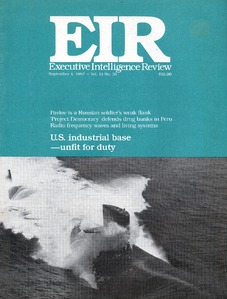Interviews
Sheila Jones
by Ortrun Cramer
The political leader from Illinois received a wan welcome on her trip to India to organize support for the defense of the human rights of Lyndon LaRouche and his associates in the United States.
Book Reviews
Pavlov Is a Russian Soldier’s Weak Flank
by Lyndon H. LaRouche, Jr.
Critically reviews Spetsnaz, the Story Behind the Soviet SAS, by Viktor Suvorov. The Pavlovian training of Soviet military personnel is of utmost relevance to Western strategic planners today, in confronting Marshal Ogarkov’s war plans.
The Offensive Culture of the Rodina
Fiction Highlights NATO-Soviet Conflict
by Anthony K. Wikrent
Reviews The Hunt for Red October and Red Storm Rising, by Tom Clancy.
Intoxicated with Its Own Lies
by Dana Scanlon
Review of The Media Elite, America’s New Powerbrokers, by S. Robert Lichter, Stanley Rothman, and Linda S. Lichter.
Books received
Departments
Andean Report
by Valerie Rush
The End of the Truce.
Report from Rome
by Liliana Celani
U.S.-Soviet Minuet at Erice.
Report from Rio
by Marco Monteiro
Banks’ Spies Puzzled by Summit.
Editorial
In Defense of Jorge Carrillo.
Science & Technology
How Radio Frequency Waves Interact with Living Systems
by J.W. Frazer
Some observations on bioelectromagnetics by J.W. Fraser, Professor of Pharmacology at the University of Texas Health Science Center at San Antonio, and J.E. Frazer.
AIDS Update
AIDS Sweeps Unchecked Throughout Africa
by Mary Lalevée
New Herpes Virus Is Similar to AIDS
Soviets Set Penalties for Spreading AIDS
AIDS Issue Raised in U.S.-Philippine Dispute
Economics
Boom or Bust? Debate Ignores Real Economy
by Christopher White
The “experts” have warned of the dangers of a blow-out of U.S. equity markets. But all the warnings are flawed, as regards their assumptions about the relationship between the physical economy, and the monetary side of economic processes.
U.S. Treasury Department: Save Wildlife, Starve People
by Marjorie Mazel Hecht
The malthusians at Treasury are more interested in the wild game preserves of Botswana than in its people.
AIDS Sweeps Unchecked Throughout Africa
by Mary Lalevée
The Hamburg Mafia and ‘Irangate’ Deals
by Mark Burdman
What’s behind the strange case of Lonhro’s Tiny Rowland?
The Japanese Launch an Asian Development Offensive
by Sophie Tanapura
The turn to Southeast Asia will open up new markets for Japan’s exports, as it develops the nations of the region. This report from our Bangkok correspondent highlights Thailand’s potential role.
Currency Rates
Foreign Exchange
by David Goldman
Time of Reckoning for the Dollar.
Business Briefs
Feature
The United States Industrial Base—Unfit For Duty
by Marcia Merry
The arsenal of democracy? Very far from it, as Marcia Merry and Joyce Fredman report in this review of America’s economic capability for sustained war-fighting.
The Drop in Preparedness: Many Warnings
How the United States’ Marine Industrial Base Has Declined
by Joyce Fredman
Since 1946, the United States Merchant Marine has dropped from more than 3,000 ships actively engaged in U.S. ocean-borne foreign trade to a mere 470 today, of which 100 are inactive.
A Proposal for the Semiconductor Crisis
by Marcia Merry
Security Emergency in Fastener Sector
by Joyce Fredman
Cheap imported nuts, bolts, screws, and rivets have been found defective on a wide scale and threaten the capacity of some of the military’s most important weaponry.
International
Moscow Forgets ‘Glasnost,’ Defends Hitler-Stalin Pact
by Luba George and Konstantin George
Gorbachov the “reformer”? In the wake of anti-Soviet demonstrations in the Baltic republics, the Kremlin is stridently defending its imperial right to occupy, enslave, and kill captive peoples.
Project Democracy’s Frontmen Defend Drug Bankers in Peru
by Gretchen Small
The international drug-legalization lobby has taken the lead in organizing a “bankers’ insurrection” against the government of Alan García.
Documentation: Profile of a drug legalizer: Mario Vargas Llosa.
The ILD’s Strategy: ‘Freedom’ To Be Poor
Soviet Brass Is Worried over SDI
by Rachel Douglas
Gen. Col. V.N. Lobov’s attack on the goals of SDI is really a statement of the Soviets’ own goals.
Gulf: U.S. ‘One Step Ahead of Soviet’
by Jeffrey Steinberg
U.S. force concentrations there have effected a much broader strategic shift.
New Ambassador To Oust Pakistan’s Zia?
by Allen Douglas
Arnold Raphel was a key figure in the State Department Policy Planning Group’s Iran and Persian Gulf section during late 1978.
International Intelligence
National
Moscow Wonders: Ambiguity or Chaos in Washington?
by Criton Zoakos
If Kremlin strategists look at U.S. military deployments in the Gulf, they draw one set of, mostly alarmed, conclusions; if they look at U.S. diplomatic deployments in Western Europe, especially around the disastrous, “zero-zero” agreement, they must be very pleased. Which foreign policy is policy?
Rights Group To Hear ‘The LaRouche Case’
How the Government Created ‘Complaints’ against LaRouche
More excerpts from the motions filed by the presidential candidate in Boston, showing that he is the target of a political witchhunt.
Eye on Washington
by Nicholas F. Benton
Reagan Recalls a 1976 Conversation.
Congressional Closeup
by Ronald Kokinda
National News



